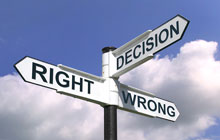While capitalism may be the best system that we can come up with, it certainly isn’t perfect. No serious discussion of this question can ignore the observation that not all people begin with the same level of opportunity. While the current welfare system has many shortcomings, it is attempt to remedy this inequality of opportunity. How can we address this issue while maintaining a free market system? This doesn’t mean that we must therefore embrace the liberal welfare system, but it is important to at least recognize that this issue exists. Maybe we could include a section in the course that explains this perspective—capitalism, because our world is fallen and humans are sinful.
Walter E. Williams of George Mason University is an economist who has thought about this problem a great deal. The following article is his take on how free markets are for the common good, not just that of the rich.
Markets, Governments, and the Common Good
By Walter E. Williams (Source)
Let us begin with a discussion of a working definition of markets. Markets are simply millions upon millions, internationally billions upon billions, of individual decision-makers, engaged in the pursuit of what they determine to be their best interests. We say that the market is free if it is characterized by peaceable, voluntary exchange, private property rights, rule of law and limited government intervention and control. Liberals often denounce free markets as immoral. The reality is exactly the opposite. Free markets are more moral than any other system of resource allocation. Let us examine the moral superiority of free markets.
Say that you hire me to mow your lawn and afterwards you pay me $30. What I have earned might be thought of as certificates of performance, i.e. proof that I served you. With these certificates of performance in hand, I visit my grocer and demand 3 pounds of steak and a six-pack of beer that my fellow man produced. In effect, the grocer asks, “Williams, you’re demanding that your fellow man, as ranchers and brewers, serve you; what did you do in turn to serve your fellow man?” I say, “I mowed my fellow man’s lawn.” The grocer says, “Prove it!” That’s when I hand over my certificates of performance — the $30.
A resource allocation method that requires that I serve my fellow man in order to have a claim on what he produces is far more moral than government resource allocation. The government can offer, justifying it with one reason or another, “Williams, you don’t have to serve your fellow man in order to have a claim on what he produces. Through the tax code, we’ll take what he produces and give it to you.” Of course, if I were to privately take what my fellow man produced, we’d call it theft. The only difference is when the government does it, that theft is legal but nonetheless theft — the taking of one person’s rightful property to give to another.
The essence of free markets is good-good exchanges. Exchanges of this sort are featured by the proposition: “I’ll do something good for you if you do something good for me.” Game theorists recognize this as a positive-sum game — a transaction where both parties, in their own estimation, are better off as a result. An example of this is where I go to my grocer and offer the following proposition: If you do something good for me, give me that gallon of milk, I’ll do something good for you, give you three dollars. I am better off because I valued the milk more than I valued the three dollars and he is better off because he valued the three dollars more than he valued the gallon of milk.
Of course there’s another type of exchange not typically, voluntarily entered into, namely good-bad exchanges. An example of that kind of exchange would be where I approached my grocer with a pistol telling him that if he didn’t do something good for me, give me that gallon of milk, I’d do something bad to him, blow his brains out. Clearly, I would be better off, but he would be worse off. Game theorists call that a zero-sum game — a transaction where in order for one person to be better off, of necessity the other must be worse off. Zero-sum games are transactions mostly initiated by thieves and governments, both are involved in what is euphemistically called income redistribution.
Wonders of Greed
What human motivation is responsible for getting the most wonderful things done? I would say greed. When I use the term greed, I do not mean cheating, stealing, fraud and other acts of dishonesty, I mean people seeking to get the most for themselves. One might be tempted to use “enlightened self interest” but I like greed better. Unfortunately, many people are naive enough to believe that it is compassion, concern, and “feeling another’s pain” that’s the superior human motivation. As such we fall easy prey to charlatans, quacks and hustlers.
Since it’s not considered polite, and surely not politically-correct to come out and actually say that greed gets wonderful things done, let me go through a few of the millions of examples of the benefits of people trying to get more for themselves. There’s probably widespread agreement that it’s a wonderful thing that most of us own cars. Is there anyone who believes that the reason we have cars is because Detroit assembly line workers care about us? It’s also wonderful that Texas cattle ranchers make the sacrifices of time and effort caring for steer so that New Yorkers can have beef on their supermarket shelves. It is also wonderful that Idaho potato growers arise early to do back-breaking work in the hot sun to ensure that New Yorkers also have potatoes on their supermarket shelves. Again, is there anyone who believes that ranchers and potato growers, who make these sacrifices, do so because they care about New Yorkers? They might hate New Yorkers. New Yorkers have beef and potatoes because Texas cattle ranchers and Idaho potato growers care about themselves and they want more for themselves. How much steak and potatoes would New Yorkers have if it all depended on human love and kindness? I would feel sorry for New Yorkers. Thinking this way bothers some people because they are more concerned with the motives behind a set of actions rather than the results.
This is what Adam Smith, the father of economics, meant in The Wealth of Nations when he said, “It is not from the benevolence of the butcher, the brewer, or the baker, that we expect our dinner, but from their regard to their own interests.” In other words, the public good is promoted best by people pursuing their own private interests. In the case of New Yorkers, enjoying their beef and potatoes, I think they are far more concerned about enjoying those items than the motives or intentions of the suppliers. Smith also said, “I have never known much good done by those who affected to trade for the public good.”
Parity of the Market
There is another feature of the free market that often goes unappreciated. That is the parity of the market place. The market is an extreme form of democracy: one man-one vote. While the rich have many more dollars than I have, my one dollar is just as valuable as a rich man’s one dollar. One might assert that common people do not have access to Rolls Royces and yachts. You would be wrong. Microsoft’s Bill Gates is super-rich and can afford to ride in a Rolls Royce and go yachting; but so can the common man – just not as long. He can rent a Rolls or a yacht for a day, half-day or an hour. This is something often forgotten: people can bid on quantity as well as price.
Market capitalism is the best thing that ever happened to the common man. The rich have always had access to entertainment, often in the comfort of their palaces and mansions. The rich have never had to experience the drudgery of having to beat out carpets, iron their clothing or slave over a hot stove all day in order to have a decent dinner. They could afford to hire people. Capitalism’s mass production and marketing have made radios and televisions, vacuum cleaners, wash-and-wear clothing and microwave ovens available and well within the means of the common man; thus, sparing him of the boredom and drudgery of the past. Today, the common man has the power to enjoy much (and more) of what only the rich could afford yesteryear.
What about those who became wealthy producing these comforts available to the common man? Henry Ford benefitted immensely from mass producing automobiles but the benefits received by the common man, from being able to buy a car, dwarfs anything Ford received. Individuals who discovered and companies who produced penicillin, polio and typhoid vaccines may have become very wealthy but again it was the common man who was the major beneficiary. In more recent times, computers and software products have benefitted our health, safety and quality of life in ways that dwarf whatever wealth received by their creators.
Capitalism is relatively new in human history. Prior to the rise of capitalism, the way people amassed great wealth was by looting, plundering and enslaving their fellow man. Capitalism made it possible to become wealthy by serving one’s fellow man. Capitalists seek to discover what people want and then produce and market it as efficiently as possible. Here’s a question that we should ponder in light of anti-market demagoguery: are people who by their actions created unprecedented convenience, longer life expectancy and made more fun available for the ordinary person, and become wealthy in the process, deserving of all the scorn and ridicule heaped upon them by intellectuals and politicians? Are the wealthy really obliged to “give something back?” After all, what more do the wealthy discoverers and producers of, say, life-saving antibiotics owe us? They’ve already saved lives and made us healthier.
Despite the miracles of capitalism, it doesn’t do well in popularity polls. One of the reasons is that capitalism is always evaluated against the non-existent, non-realizable utopias of socialism or communism. Any earthly system, when compared to a Utopia will pale in comparison. But for the ordinary person, capitalism, with all of its warts, is superior to any system yet devised to deal with our everyday needs and desires.
Rights versus Wishes
Often people speak of rights to housing, medical care, food and other goods and services deemed necessary for the sustenance of life. That is a vision that leads to a gross violation of most standards of morality. In standard usage of the term, a right, sometimes called negative rights, is something that exists simultaneously among people. A right confers no obligation on another. For example, the right to free speech is something we all possess simultaneously. My right to free speech imposes no obligation upon another except that of non-interference. Similarly, I have a right to travel freely. That right imposes no obligation upon another except that of non-interference.
Contrast those rights to the supposed right to medical care or decent housing whether one can afford it or not. Through government actions, those supposed rights do confer obligations upon others. Government has no resources of its very own. The money coming from federal, state and local governments pay for those “rights” are not the result of politicians reaching into their own pockets. Moreover, there is no Santa Claus or Tooth Fairy who provides the money. The recognition that government has no resources of it very own forces one to recognize that the only way government can give one person a dollar is to first take it from someone else. A government granted right to medical care, housing or anything else confers an obligation on other American have less of something else, namely diminished rights to his earnings. That is, if one person has a right to something he did not earn, it requires another to not have a right to something he did earn.
Let’s apply this bogus concept of rights, some might call positive rights, to free speech and the right to travel freely. In that case, my free speech rights would confer financial obligations on others to supply me with an auditorium, microphone and audience. My right to travel would require that others provide me with airplane tickets and hotel accommodations. Most Americans, I would imagine, would tell me, “Williams, yes you have rights to free speech and travel rights, but I’m not obligated to pay for them!”
As human beings we all have certain unalienable rights, as so eloquently stated in our Declaration of Independence. Of the rights we possess, we have a right to delegate to government. For example, we all have a right to defend ourselves against predators. Since we possess that right, we can delegate it to government. In other words, we can say to government, “We have the right to defend ourselves but for a more orderly society, we delegate to you the authority to defend us.” By contrast, I do not possess the right to take the property of one person to give to another. Since I do not possess such a right, I cannot delegate it to government. If you’re a Christian or simply a moral human being, you should be against these so-called rights. After all when God gave Moses the Eighth Commandment, “Thou shalt not steal”, I’m sure that he didn’t mean thou shalt not steal unless there was a majority vote in Congress. Moreover, I’m sure that if you were to have a heart to heart conversation with God and asked him, “God, is it okay to be a recipient of stolen property?” I’m guessing He would say that being a recipient of stolen property is a sin as well. Decent housing, good medical care and decent jobs are not rights at all, at least not in a free society; they’re wishes. As such I would agree with most Americans because I too wish that everyone had decent housing, a high paying job and good medical care. I would go further to say that I believe one should assist his fellow man in need. Doing so by reaching into one’s own pockets to help him is praiseworthy and laudable. Reaching into someone else’s pockets to do so is despicable and worthy of condemnation.
Common Good
If the common good or social justice has any operational meaning at all, it means that there is a system of governance where the purpose of laws is to prevent one person from violating another person’s right to acquire, keep and dispose of property in any manner so long as he does not violate another’s similarly held rights. In other words, laws should be written to prevent force and fraud. Laws that force one person to serve the purposes of another are immoral. An extreme example is slavery. Most people agree that slavery is immoral. But what makes it so? Slavery denies a person the right to use his property (body) and the fruits of his labor the way he sees fit. Slavery forcibly uses one person to serve the purposes of another. Tragically, most Americans, including blacks, whose ancestors have suffered from gross property right violations, think it quite proper that one person be forcibly used to serve the purposes of another.
Today, our government has become increasingly destructive of the ends it was created to serve. Americans have become increasingly hostile and alien to the liberties envisioned by the Framers. We have disregarded the inscription that graces the wall at the U.S. Department of Justice warning, “Where the law ends tyranny begins.” Or as Justice Louis Brandeis put it, “The makers of our Constitution conferred, as against the Government, the right to be left alone–the most comprehensive of rights and the right most valued by civilized men.”











